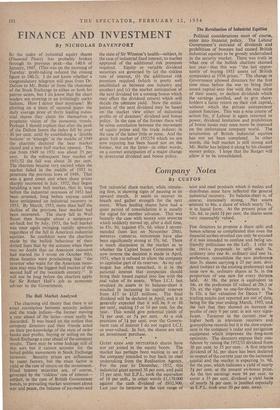FINANCE AND INVESTMENT By NICHOLAS DAVENPORT So the index of
industrial equity shares (Financial Times) has probably broken through its previous peak—the 140.6 of January, 1947. (This was on the morning of Tuesday: profit-taking reduced the closing figure to 140.2). I do not know whether a congratulatory telegram will pass from Dr. Dalton to Mr. Butler or from the chairman of the Stock Exchange to either or both his patron saints, but I do know that the chart readers are crowing in an irritatingly cocky fashion. How I detest their mystique! By plotting on a piece of squared paper the daily average price of thirty leading indus- trial shares they claim for themselves a prophetic vision of the economic trends. Perhaps I should explain that after the peak of the Dalton boom the index fell by pver 30 per cent, until by establishing a 'double bottom' or `.triangle' in the middle of 1949 the chartists declared the bear market closed and a new bull market opened. The rise from 1949 to 1951 was about 35 per cent. In the subsequent bear market of 1951/52 the fall was about 26 per cent. The chartists became very excited when the market failed in the middle of 1952 to penetrate the previous lows of 1949. That was a good omen and when share prices sharply recovered in July, 1952, they began heralding a new bull market, that is, long before the industrial recession of 1952 had been arrested, long before anyone could have anticipated an industrial recovery in 1953. By March, 1953, more than half the decline of the previous bear market had been recovered. The sharp fall in Wall Street then brought about a temporary set-back but by July, 1953, the bull market was once again swinging rapidly upwards regardless of the fall in American industrial equities. So confident were the chartists made by the bullish behaviour of their dotted lines that by the autumn when there was no doubt that an American recession had started (so I wrote on October 9th), these fanatics were proclaiming that "the investor who waits for the American reces- sion may miss the biggest bull market of the second half of the twentieth century." It will not be long before the chartists apply for Sir Robert Hall's job as economic adviser to the Government.
The Bull Market Analysed the state of Sir Winston's health—subject, in the case of industrial fixed interest, to market appraisal of the additional risk premium required. Equity or variable dividend securities are governed by (a) the riskless rate of interest, (b) the additional risk premium required (which is pretty well established as between one industry and another) and (c) the market anticipation of the next dividend (or a coming bonus which may effect the dividend return) which .will decide the ultimate yield. Now the antici- pation of the next dividend may be based on the market view either of industrial profits or of directors' dividend and bonus policy. In the case of the former there will be some correlation between the movement of equity prices and the trade indices: in the case of the latter little or none. And the great bull market of 1952/54 which we are now enjoying has been based not on the former, but on the latter—in other words, on a correct anticipation of a major change in directorial dividend and bonus policy. The Revaluation of Industrial Equities Political considerations must of course, enter into financial, policy. The Labour Government's restraint of dividends and prohibition of bonuses had caused British industrial equities to be grossly undervalued in the security market. There was truth in what one of the bullish chartists claimed last year—that this was "the last oppor- tunity of buying 1953 assets (of British companies) at 1936 prices." The change in Government allowed directors for the first time since before the war to bring their issued capital into line with the real value of their assets, to declare dividends which the earnings justified, and to give share- holders a fairer return on their risk capital,, without which the private entrepreneur cannot function. This was a wise course of action for, if Labour is again returned to power, dividend limitation and prohibition of bonus issues may once more be imposed on the unfortunate company world. The revaluation of British industrial equities has not yet been completed. In other words, the bull market is still strong and Mr. Butler has helped it along by his cheaper money policy. I hope that the Budget will allow it to be consolidated.


































 Previous page
Previous page